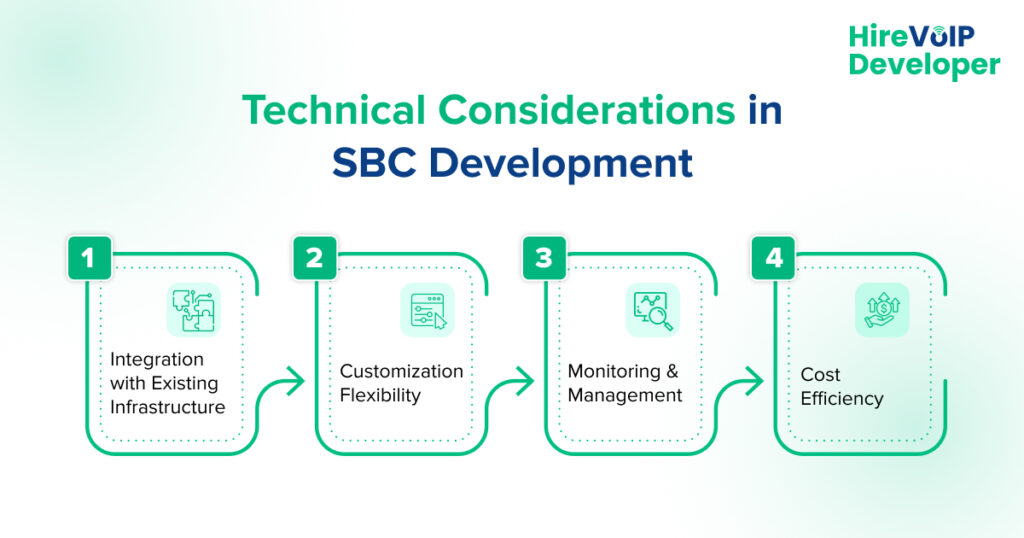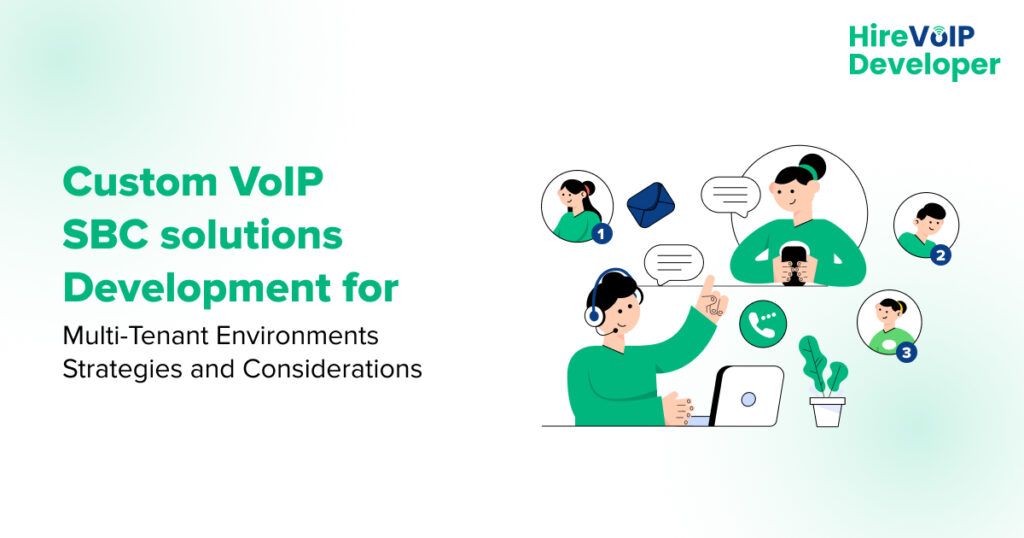Businesses continually seek scalable, secure, and efficient communication solutions in the rapidly expanding realm of Voice over Internet Protocol (VoIP). A critical component that often surfaces in these discussions is the Session Border Controller (SBC). Specifically, in environments where service providers wish to host multiple clients on a single platform, custom VoIP SBC development for multi-tenant environments becomes invaluable. This blog explores the intricacies of designing SBC solutions tailored for multi-tenant architectures, providing strategies and considerations to guide enterprises and service providers in making informed decisions.
Understanding the Role of SBC Development in VoIP
Before diving into the complexities of multi-tenant SBC development, it’s essential to clarify what SBCs are and their role in VoIP networks. An SBC serves as a guardian at the edges of VoIP networks, managing and securing voice signals as they travel in and out of the network. Key functionalities include signal translation, media transcoding, call admission control, and ensuring the security of VoIP communications by preventing toll fraud and denial of service attacks.
According to market data forecast, the Global Session Border Controller (SBC) Market was valued at USD 665 million in 2023 and is expected to exceed USD 950 million by the end of 2029, with a CAGR of 6.12% during the forecast period 2024 to 2029.
The Demand for Multi-Tenant Environments
A multi-tenant environment refers to a single instance of software running on a server that serves multiple tenant groups. In VoIP, a multi-tenant SBC allows service providers to manage several clients or tenant groups on a single SBC platform. This cost-efficient architecture simplifies management and scales up operations as businesses grow.
Strategic Considerations for Custom SBC Development
Developing Session Border Controllers for multi-tenant environments demands meticulous planning and strategic foresight. These environments are characterized by their ability to host multiple clients or tenants on a single platform, each with its resources and configurations. Here are vital considerations to keep in mind when developing SBC solutions tailored for such settings:
1. Scalability
Custom SBC solutions must be inherently scalable to accommodate the varying needs of multiple tenants. Scalability in a multi-tenant cloud environment involves dynamic resource allocation that can respond to each tenant’s changing demand without compromising performance.
2. Security
Each tenant’s data and communication must be securely isolated from others to prevent any unauthorized access or data breaches. Custom SBCs should implement robust security measures to safeguard sensitive information, including encryption, secure signaling, and regular security audits.
3. Compliance and Interoperability
Developing a custom SBC solution requires adherence to industry regulations and standards, which can vary by region and industry. Moreover, the SBC must be interoperable with various communication protocols and third-party services like PSTN gateways and multi-tenant SIP trunks.
Unlock 25% Faster Connectivity with Our Tailored SBC Platforms.
4. High Availability and Reliability
In multi-tenant environments, downtime for one tenant can affect others. Custom SBCs must guarantee high availability and reliability through redundant systems and failover mechanisms to maintain continuous service.
5. Integration Capabilities
SBCs should seamlessly integrate with existing VoIP infrastructures and other third-party systems, such as CRM software, VoIP billing platforms, and analytics tools. This integration capability enhances functionality and fully allows tenants to leverage their SBC solutions.
Focusing on the considerations for SBC Development in Multi-Tenant Environments to meet the demanding requirements of modern VoIP networks enhances tenants’ communication capabilities. It strengthens their trust in the service provider’s ability to manage their critical communication infrastructure.
Technical Considerations in SBC Development

As enterprises and service providers aim to grow the number of users while maintaining security, efficiency, and scalability, the role of SBCs becomes more significant. Here are the key technical considerations for developing robust SBC solutions, especially in multi-tenant cloud environments.
1. Integration with Existing Infrastructure
A multi-tenant SBC solution should seamlessly integrate with existing VoIP infrastructures, including IP-PBX systems, VoIP gateways, and CRM software. This integration is critical for providing a unified communication experience across the board.
2. Customization Flexibility
Each tenant may have unique needs and requirements. The SBC should offer customization options allowing tenants to configure features such as call routing, security settings, and user interface according to their needs.
3. Monitoring and Management
Effective monitoring and management tools are essential for overseeing the operation of a multi-tenant SBC solution. These tools should provide real-time insights into traffic patterns, usage statistics, and system health, helping administrators make informed decisions quickly.
4. Cost Efficiency
Cost efficiency must be a priority when developing a custom SBC for a multi-tenant environment. The solution should optimize resource usage and operational costs, offering an affordable yet powerful solution for small to large enterprises.
By addressing these critical considerations, developers can create SBCs that meet businesses’ current demands and are scalable, secure, and ready for future challenges. A well-crafted SBC is a cornerstone of modern VoIP communication strategies, whether for a small enterprise or a sizable multi-tenant environment.
Enhancing Performance through Advanced Features
Developing a custom SBC solution offers the opportunity to integrate advanced features that can significantly enhance the performance and functionality of the VoIP system. Features such as advanced routing algorithms, deep packet inspection, and real-time analytics can provide greater control, improved security, and better service quality. Additionally, incorporating AI-driven capabilities such as predictive analytics and automated threat detection can further optimize the performance and security of the SBC.
Prioritizing User Experience and Quality of Service
Ensuring a superior user experience is paramount in multi-tenant environments. Custom SBC solutions should include quality of service (QoS) management features that prioritize voice traffic and maintain high-quality communication standards across all tenants. Effective QoS mechanisms help minimize latency, jitter, and packet loss, crucial for maintaining clear and reliable voice communications.
Future Trends and Innovations in SBC Development
As technology advances, the development of Session Border Controllers (SBC) is poised for transformative advancements that promise to optimize VoIP services in multi-tenant environments further. These innovations are not merely enhancements but pivotal in addressing modern telecommunication frameworks’ growing complexity and demands.
1. Integration of AI and Machine Learning
Integrating artificial intelligence (AI) and machine learning into SBC development is set to revolutionize how these systems manage data and handle operations. By leveraging AI, SBCs can predict traffic patterns, optimize resource allocation, and enhance security measures against increasingly sophisticated cyber threats. AI can provide tailored experiences and automated adjustments for multi-tenant solutions that respond to specific tenant needs without manual intervention.
2. Blockchain for Enhanced Security
Blockchain technology provides a unique approach to enhancing the security frameworks of multi-tenant SBC solutions. Blockchain can significantly reduce data tampering and fraud risk by decentralizing data control and management. This technology ensures that all transactions within the SBC environment, including configurations and data access logs, are immutable and traceable, offering an additional layer of security in multi-tenant platforms.
3. 5G Technology Integration
The rollout of 5G technology presents a significant opportunity for VoIP SBC development. With its promise of higher data speeds, lower latency, and increased connectivity, 5G can enhance the performance of SBCs, particularly in handling high-volume, high-density communication traffic. 5G enables more reliable and efficient service delivery for multi-tenant environments, even under increased data loads from multiple tenants.
4. Advanced Multi-Tenancy Features
As the demand for multi-tenant cloud environments grows, experts expect SBCs to evolve to offer more granular multi-tenancy capabilities. These include improved isolation techniques that ensure the operations of one tenant do not affect another and enhanced customization features that allow tenants to manage their SBC environment according to their specific needs. Features such as multi-tenant SIP trunks and integrated PSTN gateways will become more adaptable, providing tenants with a seamless and secure communication experience.
5. Regulatory Compliance Automation
As regulatory frameworks around telecommunications and data security become stricter, SBCs must automatically ensure compliance. Future developments may include built-in compliance modules that can adapt to different legal requirements across jurisdictions, simplifying the process for VoIP providers and reducing the risk of non-compliance penalties.
The development of Session Border Controllers (SBCs) keeps pace and is poised to lead transformative changes within the VoIP sector. These advancements are pivotal, not merely incremental enhancements, as they address the increasing complexity and demands of modern telecommunications frameworks.
Upgrade to a Scalable, Secure SBC Solution—Only 10 Slots Available.
Securing VoIP’s Future with Tailored SBC Solutions
The evolution of SBC development for multi-tenant environments is pivotal for modern VoIP communications. The advancements in AI, Blockchain, 5G technology, and enhanced multi-tenancy features are setting the stage for more secure, efficient, and scalable VoIP solutions. By focusing on these innovative trends, businesses can ensure their communication infrastructure is robust, future-proof, and capable of handling the complexities of today’s telecommunication demands. As enterprises seek scalable, secure, and efficient solutions, investing in custom SBC development becomes indispensable. You can hire an SBC Developer with us to ensure your business stays ahead with cutting-edge communication solutions tailored to your needs.


